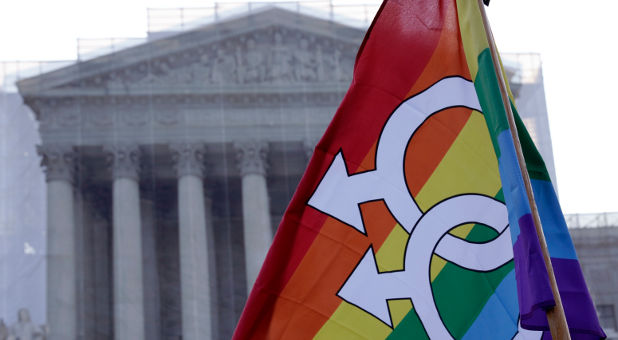Theological Reflections on Homosexuality as We Await the Supreme Court’s Decisions
Some fine legal analyses exist concerning the Supreme Court’s rulings on the Proposition 8 and Defense of Marriage Act cases next week. Other very thorough, and quite sobering, projections regarding the implications of each decision, however decided, are also both excellent and readily accessible.
Although Family Research Council has filed amicus curiae briefs regarding both cases, this piece is neither legal analysis nor prognostication. Instead, what follows is a compilation of comments from Christian thinkers whose thinking about homosexuality is wise, theologically sound and compassionate.
“One ordinary day, I came to Jesus, openhanded and naked. … Jesus triumphed,” writes Rosaria Champagne Butterfield, Ph.D., former tenured professor of English at Syracuse University and former lesbian and LGBT movement activist. “And I was a broken mess. Conversion was a train wreck. I did not want to lose everything that I loved. But the voice of God sang a sanguine love song in the rubble of my world. I weakly believed that if Jesus could conquer death, He could make right my world. I drank, tentatively at first, then passionately, of the solace of the Holy Spirit. I rested in private peace, then community and today in the shelter of a covenant family, where one calls me ‘wife’ and many call me ‘mother.’ I have not forgotten the blood Jesus surrendered for this life. And my former life lurks in the edges of my heart, shiny and still like a knife.”
Anglican theologian and Christian statesman John R.W. Stott, Ph.D., says, “God created humankind male and female; God instituted marriage as a heterosexual union; and what God has thus united, we have no liberty to separate. This threefold action of God established that the only context which He intended for the ‘one flesh’ experience is heterosexual monogamy and that a homosexual partnership (however loving and committed it may claim to be) is ‘against nature’ and can never be considered as a legitimate alternative to marriage.”
Al Mohler, Southern Baptist Theological Seminary president, writes, “We sin if we call homosexuality something other than sin. We also sin if we act as if this sin cannot be forgiven. We cannot settle for truth without love nor love without truth. The gospel settles the issue once and for all.”
“Pro-homosexual activists have begun to demand that no debate on the issue of homosexuality be permitted,” explains Peter Sprigg, senior fellow at Family Research Council. “Yet there are legitimate grounds for debate on the origin, nature and consequences of homosexuality. That debate should continue, with a respect for honest research and for freedom of thought, speech and religion.”
Trevin Wax, managing editor of The Gospel Project, says, “Some people have mistreated homosexuals in the past. It’s a shame that anyone anywhere would mock, taunt or bully another human being made in God’s image. That said, I think we need to make one thing clear in regard to civil discourse: To differ is not to hate. I hope we can still have a real conversation in this country about different points of view without casting one another in the worst possible light. The idea that disagreeing with homosexual behavior necessarily results in harm to gay people is designed to shut down conversation and immediately rule one point of view (in this case, the Christian one) out of bounds.”
“To affirm sin is to diminish humanity,” explains Owen Strachan, Ph.D., assistant professor of Christian theology and church history at Boyce College. “To affirm righteousness and advocate for it in a spirit of winsome courage is to restore humanity. Believers cannot support homosexuality as a God-glorifying way to live. We recognize humanity most in other people when we see how sin has trapped them, feel empathy for them and call them to the obedience of faith. This, and no other, is love; this, and nothing else, is compassionate.”
Elodie Ballantine Emig, instructor of Greek at Denver Seminary and an advisory board member of Where Grace Abounds, adds, “If we have placed our trust in the God who does not change, we need not fear shifts in culture or law. In the beginning, God ordained marriage to be a lifelong, loving covenant between one man and one woman. We need to tell this truth with conviction, regardless of politics. If we are secure in God’s love, people who reject what we believe pose no real threat to us. We are set free to love those who oppose us and to listen to their stories. It should be Christian business as usual.”
Christ is real. He changes the lives of sinners, whether homosexual or heterosexual. He offers hope and substantial restoration, as well as full transformation in eternity.
If those assertions and those made by the writers quoted above are true, Christians can await the Supreme Court’s decision not without concern but without apprehension. We know Him who both created human sexuality and also overcomes the world.
Rob Schwarzwalder is senior vice president at Family Research Council. This article appeared in Religion Today Wednesday.
















































